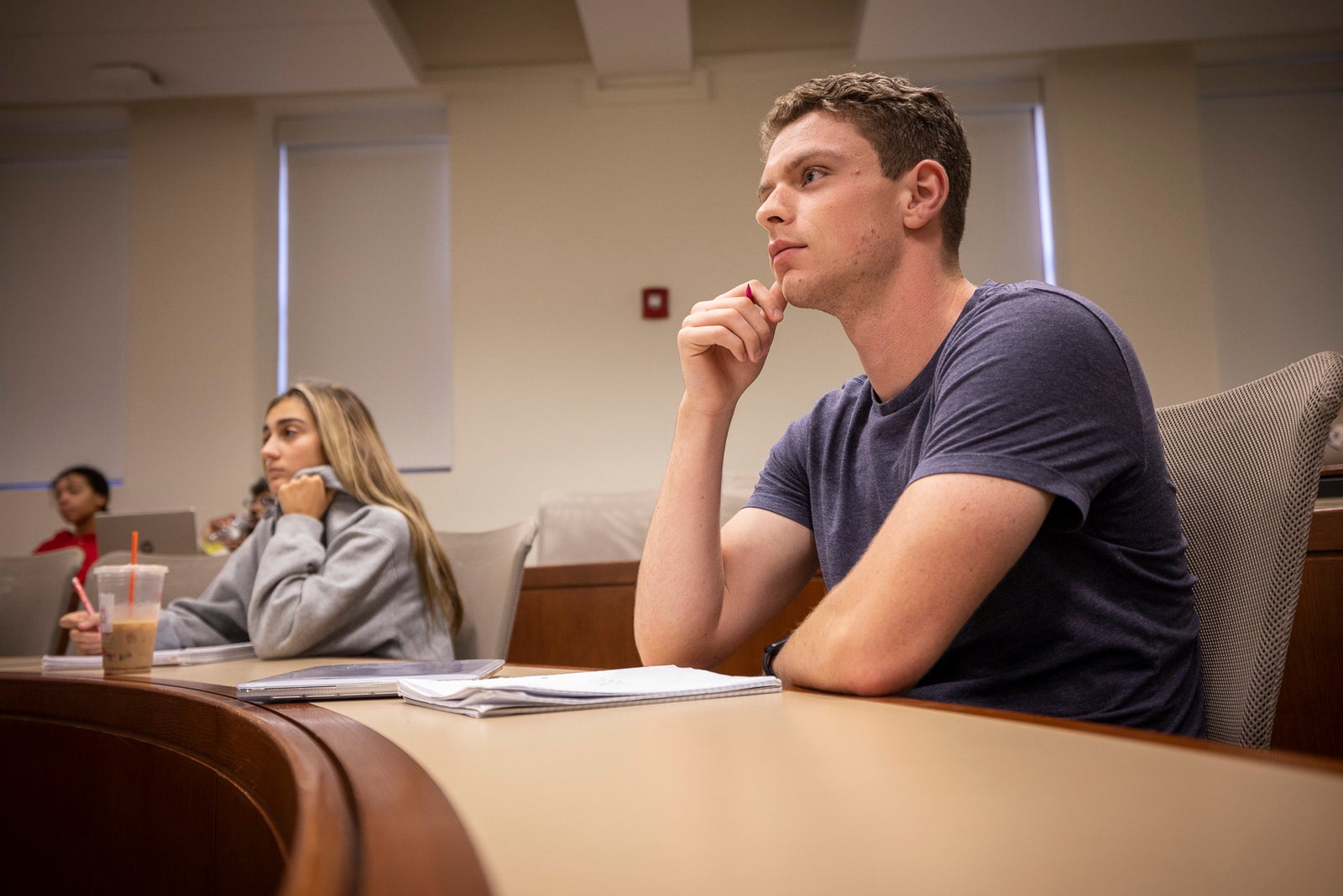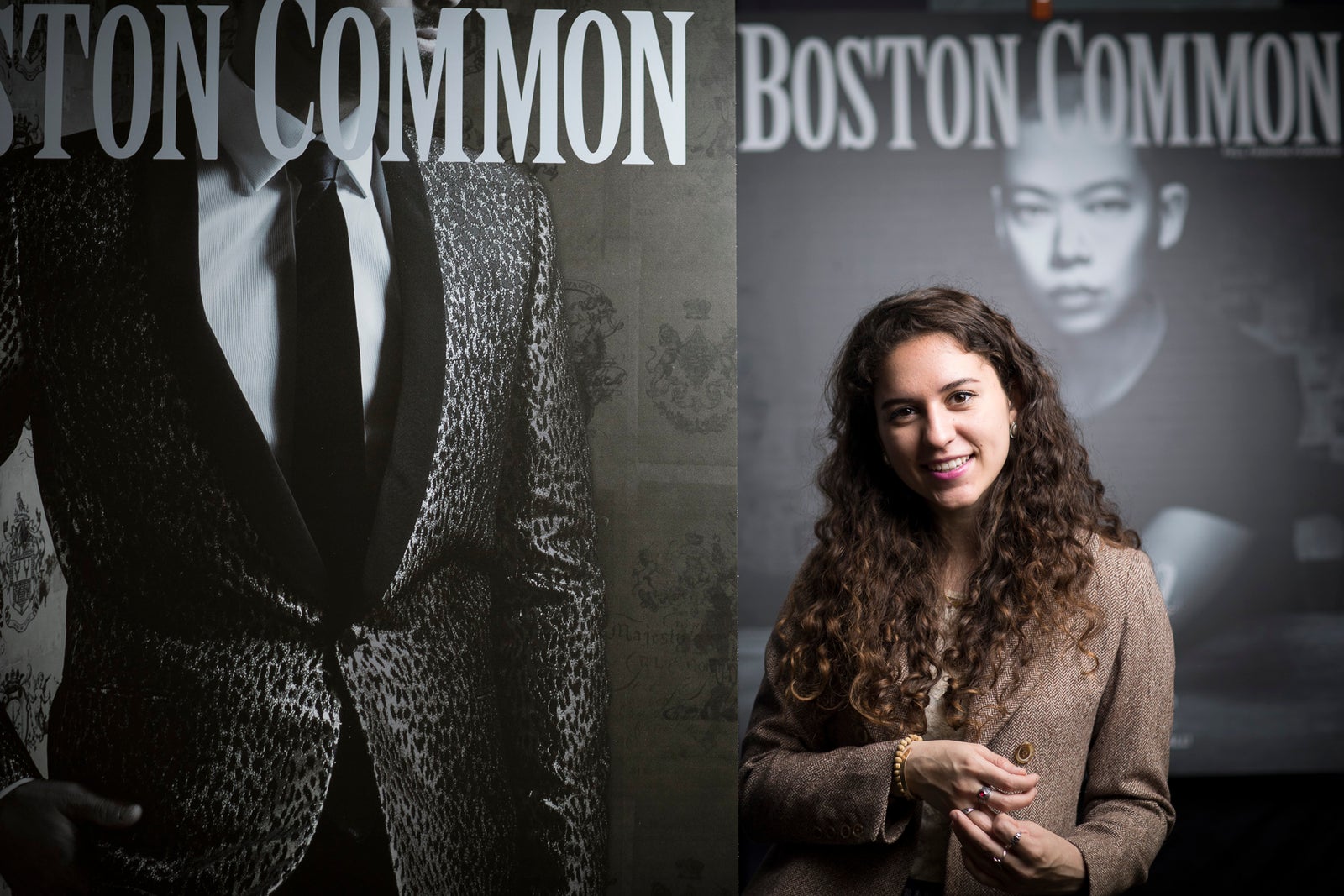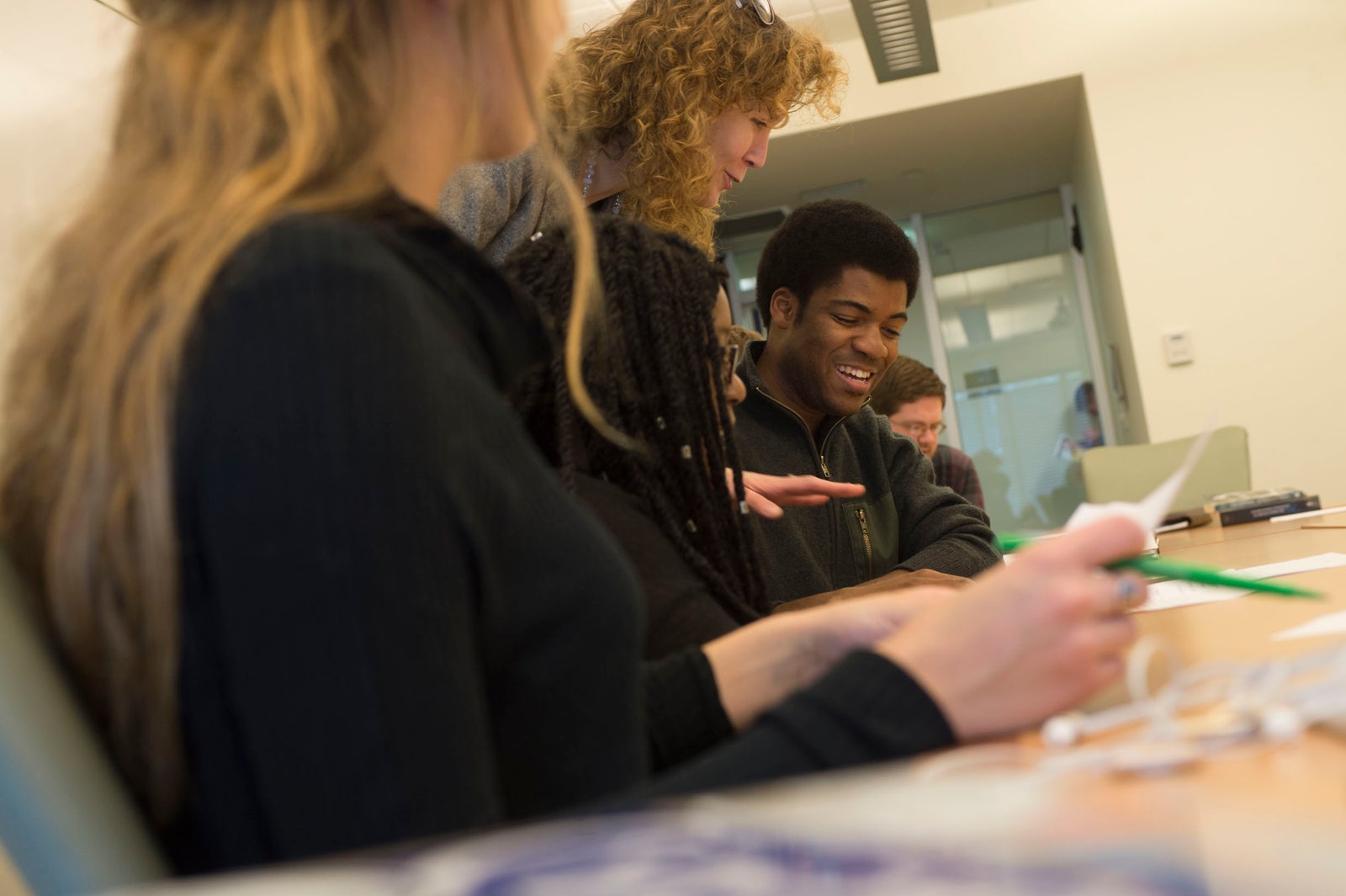Communication is connection—from the art, literature, films, advertisements and technologies that define our culture.
From early technologies like the printing press to emerging digital tools like ChatGPT, media continue to challenge our understanding of the way we, as a global society, interact with one another. Emmanuel’s program in Communication & Media Studies equips you with the knowledge and skills necessary for success as a professional communicator in an ever-changing media landscape. Core to our mission is a foundation in social justice and ethics that allows you to think critically about media texts, production, and consumption.
Our faculty provide multi-disciplinary perspectives that emphasize the bridge between communication theory and skill-based application. Engage in coursework that focuses on blending theory, historical context, methods, and experiential learning across the curriculum, allowing you to develop skills in media literacy, writing, research and message creation that are valued in the workplace.
A First-Class Experience
Get to know the people and programs that will define your academic journey.

Faculty-Student Research Spotlights: Communication & Media Studies

Meet the Faculty
Our distinguished faculty publish, exhibit and research. Present, compose and chair. Inspire and collaborate.
The Curriculum
View the 2024-2025 Academic Catalog to find course titles, numbers and descriptions.
Requirements for B.A. Communication & Media Studies
1-4. Foundations of the field (4 courses)
- COMM1502 Media & Society (SA) (SS)
- COMM2510 Professional Communication
- COMM2515 Research Methods for Communication & Media (WI)
- COMM3701 Media Theory or ENGL3703 Critical Theory and the Academy or ENGL3707 Film Theory
5-6. Communication and Media Studies. Choose two of the following (at least one must be 3000-level):
- AMST1101 Introduction to American Studies (LI)(DM)
- ART2213 Daguerreotypes to Digital Prints: The History of Photography (AI-A) (VCI) (DM)
- COMM3311 Ethics in Documentary Film
- COMM3708 Digital Culture & Social Media Promotion
- COMM3730 Feminist Media Studies
- ENGL2321 Love and Gender in British Literature and Film (AI-L)
- ENGL2701 Literature and Film (AI-L)
- ENGL3303 Images of Masculinity
- ENGL3601 Crime Stories and American Culture
- ENGL3605 Global Literature and Film
- POLSC2207 Politics and the Media
7-8. Foundations in Strategic Communication (Two courses, at least one COMM)
- COMM2501 Journalism
- COMM2521 Public Relations and Persuasion (LI)
- COMM2523 Advertising and Culture
- COMM2525 Sport Communication
- COMM3806 Health Communication (SJ)
- MGMT2211 Leadership: Person & Process
- MKTG2200 Principles of Marketing
- MKTG2500 Consumer Behavior
- POLSC2211 Campaign Strate
- COMM3701 Media Theory
- ENGL3703 Critical Theory and the Academy
- ENGL3707 Film Theory
9-10. Applying Strategic Communication: Skills-based courses (Choose one)
- ART1407 Visual Language for Design and Communication (AI-A) (VCI)
- ART2132 Data Visualization(AI-A) (VCI)
- ART2432 Poster and Information Design
- ART2443 Digital Photography I
- ART3402 Interactive Design
- ART3431 Motion Graphics and Digital Animation
- ART3432 Package and Publication Design
- COMM3501 Multimedia Storytelling
- COMM3801 Feature Writing
- ENGL2504 Prose Writing
- ENGL2507 Fiction Writing
- ENGL3405 Editing and Publishing a Literary Magazine
- ENGL3504 Advanced Prose Writing
- SPCH111 Public Speaking: Voice and Diction
AND
- ENGL4994/ENGL4995 Internship I & II
11. Communication & Media Studies Elective (One additional COMM course)
12. Capstone Research Seminar
- ENGL4998 Communication and Media Studies Senior Seminar
View the 2024-2025 Academic Catalog to find course titles, numbers and descriptions.
Requirements for Minor in Communication & Media Studies
- COMM1502 Media & Society (SA) (SS)
- COMM2510 Professional Communication OR COMM2515 Research Methods for Communication & Media (WI)
Students must take three additional courses from the communication menu, one from each of the following categories:
- One course from the Communication and Media Studies Category
- One course Foundations in Strategic Communication Category
- One additional COMM elective
The communication and media studies minor is available to all students, including those majoring in English and Writing, Editing & Publishing
The Communication and Media Studies major provides students with multi-disciplinary perspectives on media texts, production, and consumption, grounded in the study and practice of contemporary issues in the field. Coursework focuses on blending theory, methods, and experiential learning across the curriculum, allowing students to develop research literacy and practical skills that are valued in the workplace, such as:
- Knowledge of the history of communication and media studies, including a practical understanding of its foundational theories and principles
- Competency in qualitative media research, including approaches to textual analysis and audience research, through development of independent research projects
- Proficiency in the practical skills associated with professional communications, such as public relations, advertising, journalism, etc.
- Professional skills development via experiential learning through coursework, including an internship course
- Experiential knowledge of multimedia storytelling and digital media production
- Media literacy, particularly as it pertains to issues of equity, ethics, and social responsibility
What can I do with a degree in communication & media studies?
A degree in communication and media studies can prepare you for a variety of career paths in the media, advertising, public relations, and communication industries. Some career options include:
A degree in communications and media studies offers a diverse range of career paths across various industries. Here are some potential jobs and career paths for graduates:
Media and Journalism
- Journalist: Reporting, writing, and editing news stories for print, broadcast, and digital media.
- Broadcast Journalist: Working as a reporter, anchor, or correspondent for television or radio news programs.
- Editor: Overseeing the content and quality of publications, websites, and other media platforms.
- Producer: Managing the production of TV shows, movies, radio programs, or online content.
Public Relations and Advertising
- Public Relations Specialist: Managing and maintaining a positive public image for organizations, companies, or individuals.
- Social Media Manager: Creating and managing content across social media platforms to engage audiences and promote brands.
- Advertising Account Executive: Working with clients to create and manage advertising campaigns.
- Copywriter: Writing persuasive and compelling content for advertisements, websites, and marketing materials.
Corporate Communications
- Corporate Communications Specialist: Managing internal and external communications for a company.
- Media Relations Specialist: Acting as a liaison between the company and the media, handling press releases and media inquiries.
- Crisis Communications Manager: Developing strategies to handle public relations crises and maintain the company’s reputation.
Marketing and Brand Management
- Marketing Coordinator: Assisting in the development and implementation of marketing strategies and campaigns.
- Brand Manager: Overseeing the development and execution of brand strategies to enhance brand equity.
- Content Strategist: Planning and creating content to attract and engage target audiences.
Digital Media and Content Creation
- Content Creator: Producing engaging content for blogs, websites, podcasts, and video channels.
- Video Producer/Editor: Creating and editing video content for various platforms.
- Digital Marketing Specialist: Using digital channels to promote products or services and engage with customers.
Event Planning and Management
- Event Coordinator: Planning and organizing events, conferences, and exhibitions.
- Promotions Manager: Developing and implementing promotional strategies for events and activities.
Education and Training
- Communications Professor: Teaching communications and media studies at the college or university level.
- Training and Development Specialist: Creating and delivering training programs within organizations.
Other Opportunities
- Speechwriter: Writing speeches for politicians, executives, and other public figures.
- Lobbyist: Working for organizations to influence public policy and legislation.
- Media Analyst: Researching and analyzing media trends and content.
These career paths can vary widely in terms of responsibilities, work environments, and required skills, offering communications and media studies graduates many options to find a niche that suits their interests and talents.
Communication professionals need to have a broad range of skills, including:
- Strong written and verbal communication skills: Communication professionals need to be able to write clearly and effectively, as well as speak confidently in public and in meetings.
- Interpersonal skills: Communication professionals often work with a variety of people, including clients, colleagues, and media professionals. They need to be able to build and maintain positive relationships with these individuals.
- Active listening: Communication professionals must be able to listen carefully to their clients, colleagues, and audiences to understand their needs and concerns.
- Strategic thinking: Communication professionals need to be able to think critically and strategically to develop effective communication strategies that meet the needs of their clients.
- Creativity: Communication professionals often need to develop engaging and creative content that will capture the attention of their target audience.
- Project management: Communication professionals must be able to manage multiple projects simultaneously, often under tight deadlines.
- Social media skills: With the rise of social media, communication professionals need to be adept at using social media platforms to engage with audiences and promote their brand.
- Data analysis: Communication professionals need to be able to analyze data to measure the effectiveness of their communication strategies and make informed decisions.
- Cultural competence: Communication professionals must be able to understand and navigate different cultural and social contexts to effectively communicate with diverse audiences.
Overall, communication professionals need to be skilled communicators with a strategic mindset, the ability to work well with others, and the ability to manage multiple projects and tasks simultaneously. They should also have a strong understanding of the latest communication tools and technologies.
Where Essential Values and Skills Meet the Real World
Along with areas of knowledge and major requirements, you will cultivate essential values in the classroom and complete two courses in each area:
- Social Justice (SJ): Develop knowledge, skills, values and motivation to participate beneficially in activities of personal and public concern.
- Diversity & Multiculturalism (DM): Understand the complexity of identity the historical truths of different cultural perspectives to address bias and examine contemporary social issues.

One hundred percent of Emmanuel students complete an internship as part of the core curriculum. In a city as dynamic as Boston, your options are bound only by the limits of your curiosity.
Students from the English, Writing & Communications Department intern with major media outlets such as GBH, WHDH-TV and The Globe, as well as in editorial or content roles with journals and major publishers, nonprofit organizations or Boston-based tech startups.

In all majors, the Capstone Experience involves completing a significant piece of work that requires the integration and application of learning from multiple courses.
In the Capstone Experience, EWC students engage in rigorous class discussions, participate in group or individual presentations, and write a major research paper. Writing, Editing & Publishing students revise work produced in previous courses and submit for considerations at journals, magazines, anthologies and contests. Students also complete a reflection of their educational goals of the program.

Humanities & Social Sciences Spotlight
See more news and stories related to the School of Humanities & Social Sciences


